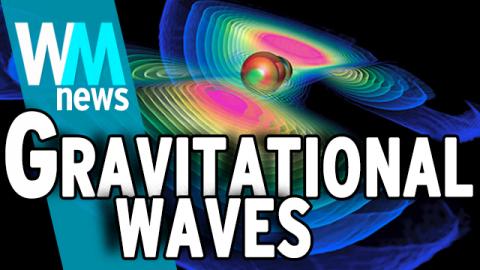Top 5 Need To Know Facts about Gravitational Waves

The way we interact with the universe around us has been changed forever. Welcome to WatchMojo News, the weekly series from http://www.WatchMojo.com, where we break down news stories that might be on your radar. In this instalment, we're counting down 5 need to know facts about Einstein's gravitational waves.
What did you think of this segment? Got any ideas for our next production? Head over to http://www.WatchMojo.comsuggest to submit your ideas today!
Top 5 Need-to-know Gravitational Waves Facts
Top 5 Air Force One Facts
The way we interact with the universe around us has been changed forever. Welcome to WatchMojo News, the weekly series from WatchMojo.com where we break down news stories that might be on your radar. In this instalment, we’re counting down 5 need to know facts about Einstein’s gravitational waves.
#5: What Are Gravitational Waves? The Definition
Top 10 NAFTA Facts You Should Know
Gravitational waves were first predicted in 1916 by Albert Einstein, as part of his theory of general relativity. The waves are a transportation of energy through space-time, whenever an object accelerates or moves. The effect is similar to that of a boat travelling through water (creating ripples), or of a heavy object being dropped onto a trampoline (shifting tension toward the center). Crucially,gravitational waves travel unimpeded across the universe. Whereas light may become blocked out or softened over space and time, gravitational waves are unchanged by intervening matter between their source and us. Therefore, to receive gravitational waves is to engage with parts of the universe previously impossible for humans to observe.
#4: What Is General Relativity? The Theory
Top 5 Disturbing Facts About Nazi Experiments
The General Theory of Relativity was published in 1915, and forms the basis for Einstein’s prediction that gravitational waves existed. It’s essentially a rethink of Isaac Newton’s classical law of universal gravitation, developed in the late 1600s. Einstein’s theory says that gravity isn’t a specific force, but the natural result of matter and energy existing in space-time. Large objects such as the sun and Earth displace energy in space-time, and pull smaller objects (like people, for example) inwards. The idea allows us to view the universe as though it’s a kind of landscape; a geometry in which the place and movement of all objects (planets included), are dictated by the curvature of space-time in which they exist. Therefore, because of the apparently infinite reach of gravitational waves, the theory can also help us understand the history of the universe, potentially as far back as the beginning of time.
#3: How Were They Discovered? The Detection
Top 5 Apartheid Facts
The first detection of gravitational waves occurred at almost 09:51 UTC on September 14th, 2015. The observation, which consisted of a ‘chirp’ signal lasting 0.2 seconds, was recorded by the Laser Interferometer Gravitational-Wave Observatory, or LIGO, at Hanford, Washington State and Livingston, Louisiana. After follow-up tests and analysis, the recording was granted a confidence level of 99.99994%, and presented as an almost certainly legitimate result. The signal came from the merging of 2 black holes over 1.3 billion light-years away from Earth. The black holes would’ve been spiraling toward each other with increasing velocity before combining, at which point the gravitational wave was strong enough to be detected by the most sensitive technologies on Earth. Executive director of LIGO, David Reitze announced the breakthrough on February 11th, 2016. [“We have detected gravitational waves,” he said, “We did it.”]
#2: How Did the World React? The Scientific Community
Top 10 Weirdest Habits of World Leaders
All across the planet, scientists greeted the ‘chirp’ with excitement. Reitze explained that ‘up until now we have been deaf to gravitational waves, but today, we are able to hear them’; while Dr. Szabolcs Marka, an astrophysicist at Columbia University, said ‘the skies will never be the same’. Renowned Royal Society professor, Brian Cox, said, ‘this opens up an entirely new way of observing the Universe’. Professor Alberto Vecchio, of the University of Birmingham and a member of the team behind the detection, elaborated, ‘this observation marks 3 milestones for physics: the first detection of gravitational waves, the first observation of a binary black hole, and the most convincing evidence to-date that Nature’s black holes are the objects predicted by Einstein’s theory’. For professor Karsten Danzmann of the Max Planck Institute for Gravitational Physics, the significance is clear. ‘There’s a Nobel Prize in it,’ he said, ‘there is no doubt’.
#1: What Does This Mean for Science? The Future
Top 5 Facts About the Impending Robopocalypse
It has been labeled as one of the most important developments in modern science, on a level with the discovery of the Higgs particle and the decoding of DNA. It has also been listed as the most significant step in our understanding of space, since Galileo pioneered the telescope. Humankind is now able to ‘hear’ the universe beyond even that which it can see, and the LIGO detection could be a major step in answering humanity’s greatest questions. Scientists anticipate similar detections to occur with increasing frequency, especially regarding some of the Universe’s most powerful and destructive events, such as neutron star collisions. Looking further into the future though, gravitational waves could help us understand previously invisible dark energy. And then there’s the ultimate quest to provide an answer to the ultimate question; theoretically, there should be gravitational wavesout there carrying the imprint of the Big Bang, which could provide humans with details as to how and why the universe was initially created. Did these facts get you thinking? To vote for which news story is covered next head over to WatchMojo.com/suggest, and be sure to hit that subscribe button for more newsworthy top tens published every week!







